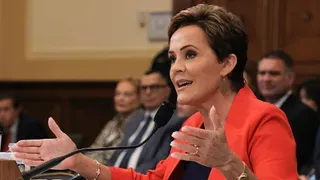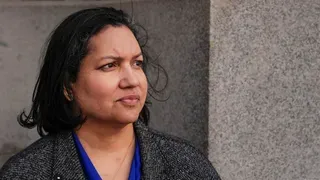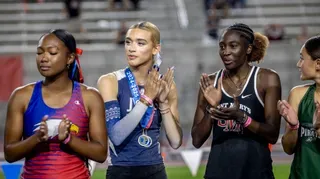February 15, 2012
New Documentary Chronicles Life of Gay Bishop
Michael K. Lavers READ TIME: 4 MIN.
It was a sultry late June afternoon in 2009 when New Hampshire Bishop V. Gene Robinson walked along Manhattan's Fifth Avenue and handed cups of water to those who were marching in New York City's annual Pride parade. He stressed the Biblical importance of giving water to the poor during a sermon he delivered at the First Presbyterian Church of New York's annual Pride service a couple of hours earlier. While the congregation traditionally hands out water to Pride marchers each year, Robinson's participation in this annual tradition that coincided with the 40th anniversary of the Stonewall riots made this simple act even more symbolic.
"This is the oppressor offering a cup of water to those we have oppressed," said Robinson, referring to religious-based homophobia. "There's power in that and there is repentance in that so I was trying to get the congregation to understand what an important symbol it was and how important it was that they do it."
This scene is one of several contained within "Love Free or Die" that chronicles three years of Robinson's life as the Episcopal Church's first openly gay bishop. Directed by Mackey Alston and produced by Sandra Itkoff, the documentary premiered at the Sundance Film Festival last month where it won a Special Jury Prize.
Robinson sat down with EDGE shortly before the Center for American Progress screened it in Washington, D.C., on Feb. 13.
"This movie kind of chronicles not just my journey, but the journey of the Episcopal Church towards a more inclusive stance," said Robinson.
Robinson's 2003 election sparked a firestorm of controversy within the broader Anglican Church. He wore a bullet proof vest during his consecration that took place inside a hockey arena on the campus of the University of New Hampshire because he had received death threats. Several dozen anti-gay protesters and students who countered them gathered outside, while sharpshooters positioned themselves on surrounding rooftops.
A handful of parishes cut ties with the Episcopal Church in response to Robinson's consecration; but his partner of nearly 25 years, Mark Andrew has quietly stood by his side.
"He's just been great," said Robinson. "He's my cheerleader. He's my bodyguard."
Andrew scanned the crowds who came to see his partner in the years immediately after his election because of the death threats the couple received. He has since embraced his role as what Robinson jokingly described as "the bishop's spouse."
"They love him," said Robinson, noting that Andrew has accompanied him to almost every parish visitation. "It's just been so delightful."
While the majority of New Hampshire Episcopalians have embraced Robinson as their bishop, the reception he has received from the Anglican hierarchy has proven far less welcoming.
Archbishop of Canterbury Rowan Williams barred Robinson from attending the decennial Lambeth Conference in England in 2008. Robinson delivered a sermon at an LGBT-friendly London parish during the gathering, but a heckler interrupted it. Parishioners clapped and sang hymns as security personnel escorted the man from the church. Robinson stood solemnly at the altar until the heckler had been removed.
"Pray for that man," he said as his voice began to tremble. "Fear is a terrible thing and the opposite of love is not hate, but fear."
Robinson described the scene inside the church as tense because it was unclear whether the heckler had a gun or a bomb inside the motorcycle helmet he held as he shouted at him. He later realized that the man was unarmed.
"More than the danger of it, I was just overwhelmed at what were the events in this guy's life that led him to be there doing that," he said. "It just made me very, very sad."
Robinson's Consecration Opened Doors for Gay Episcopalians
Since Robinson's 2003 consecration, church leaders have approved resolutions that affirmed gay and lesbian clergy and allowed bishops to bless same-sex unions. Los Angeles Bishop Mary Glasspool became the first partnered lesbian to be ordained in the church with her 2010 consecration.
Robinson also delivered a prayer at the Lincoln Memorial that kicked off President Barack Obama's inauguration. He is optimistic that the president will be re-elected in November, but he questioned those who continue to criticize Obama over his failure to publicly endorse marriage for same-sex couples.
"There is no question that he has done more for our community than any president ever before," said Robinson, referring to the White House's announcement last February that it would no longer defend the federal Defense of Marriage Act. "It's short-sighted of us to demand that he should have done more, that he's let us down because we don't have everything we want yet."
Robinson stressed he would like Obama to announce his support for nuptials for gays and lesbians, but he said it is not a good idea for him to do so until after the election. "It would just hand the Republicans an issue on a silver platter," said Robinson. "My great hope is that the president will be re-elected and his evolving will continue and that early in his second term we might get something clearer from him."
Robinson Fights to Maintain Marriage Equality in N.H.
Gays and lesbians have been able to legally marry in New Hampshire since 2010. Robinson, who entered into a civil union with Andrew in 2008, has repeatedly spoken out against a bill that would repeal the state's marriage equality law.
Lawmakers are poised to vote on House Bill 437 later this month. A recent WMUR/University of New Hampshire Survey Center poll found that 59 percent of voters oppose the measure.
"I don't think there's enough traction to overturn it," predicted Robinson. "I think we're going to be okay on that issue."
Nearly a decade after his historic consecration, Robinson's trademark humor and loquacious mannerisms remain. He plans to become more involved with both the Center for American Progress and plans to develop a social justice center at St. Thomas Parish in Washington, D.C., after he retires early next year. Robinson still finds the attention he continues to receive somewhat surreal, but he humbly accepts the suggestion that he has inspired hope among LGBT people around the world.
"If somehow there's been that kind of help given to them by my story, then why would I deprive them of that," said Robinson. "Even though it feels weird, I've learned to say, 'gosh, thank you so much.'"
Based in Washington, D.C., Michael K. Lavers has appeared in the New York Times, BBC, WNYC, Huffington Post, Village Voice, Advocate and other mainstream and LGBT media outlets. He is an unapologetic political junkie who thoroughly enjoys living inside the Beltway.





